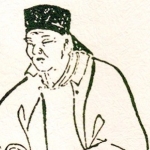When did you start your tricks
Monsieur?
What do you stand on such high legs for?
Why this length of shredded shank
You exaltation?
Is it so that you shall lift your centre of gravity upwards
And weigh no more than air as you alight upon me,
Stand upon me weightless, you phantom?
I heard a woman call you the Winged Victory
In sluggish Venice.
You turn your head towards your tail, and smile.
How can you put so much devilry
Into that translucent phantom shred
Of a frail corpus?
Queer, with your thin wings and your streaming legs
How you sail like a heron, or a dull clot of air,
A nothingness.
Yet what an aura surrounds you;
Your evil little aura, prowling, and casting a numbness on my mind.
That is your trick, your bit of filthy magic:
Invisibility, and the anæsthetic power
To deaden my attention in your direction.
But I know your game now, streaky sorcerer.
Queer, how you stalk and prowl the air
In circles and evasions, enveloping me,
Ghoul on wings
Winged Victory.
Settle, and stand on long thin shanks
Eyeing me sideways, and cunningly conscious that I am aware,
You speck.
I hate the way you lurch off sideways into air
Having read my thoughts against you.
Come then, let us play at unawares,
And see who wins in this sly game of bluff.
Man or mosquito.
You don't know that I exist, and I don't know that you exist.
Now then!
It is your trump
It is your hateful little trump
You pointed fiend,
Which shakes my sudden blood to hatred of you:
It is your small, high, hateful bugle in my ear.
Why do you do it?
Surely it is bad policy.
They say you can't help it.
If that is so, then I believe a little in Providence protecting the innocent.
But it sounds so amazingly like a slogan
A yell of triumph as you snatch my scalp.
Blood, red blood
Super-magical
Forbidden liquor.
I behold you stand
For a second enspasmed in oblivion,
Obscenely ecstasied
Sucking live blood
My blood.
Such silence, such suspended transport,
Such gorging,
Such obscenity of trespass.
You stagger
As well as you may.
Only your accursed hairy frailty
Your own imponderable weightlessness
Saves you, wafts you away on the very draught my anger makes in its snatching.
Away with a pæan of derision
You winged blood-drop.
Can I not overtake you?
Are you one too many for me
Winged Victory?
Am I not mosquito enough to out-mosquito you?
Queer, what a big stain my sucked blood makes
Beside the infinitesimal faint smear of you!
Queer, what a dim dark smudge you have disappeared into!






Comment form: